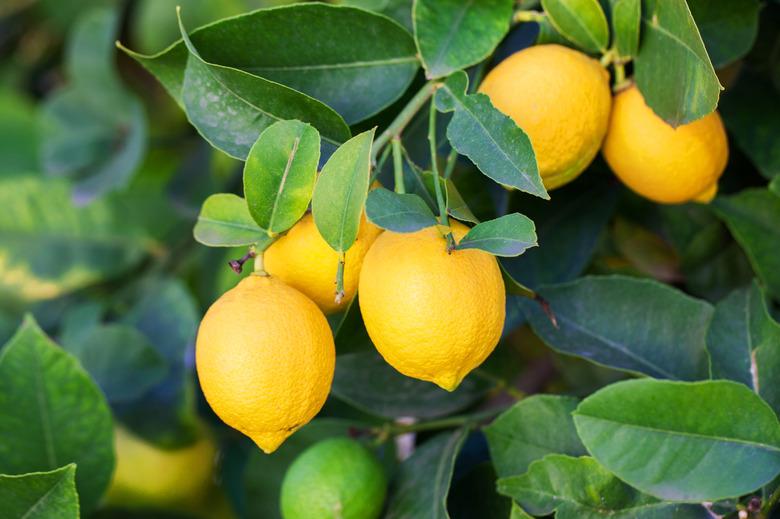How Do I Tell If My Lemon Tree Is Dead?
A lemon tree (Citrus x limon, U.S. Department of Agriculture plant hardiness zones 9 through 11) is a beautiful addition in your home or garden. Not only do you get the benefits of lemons on demand, but the lemon tree itself offers a fragrant citrus scent that is delightful both indoors and out. If your lemon tree has stopped bearing fruit or looks damaged in some way, it could be that the tree itself has died. Knowing how to tell if your lemon tree is dead can help you decide which steps to take next.
Tip
If your lemon tree stops producing flowers or fruit, its bark is cracking, or its leaves are dropping or dying, your plant may be dead or dying.
Lemon Tree Growth Cycle
Lemon trees have an unusual overlapping of growth stages between flowering and fruit harvest. They can begin flowering at any time between December and March and bloom again in fall. Fruiting begins anywhere between four and 12 months after. This means living lemon trees can have flowers and fruits at different stages of growth at the same time.
Lemon Tree Pests and Diseases
There are a few common lemon tree pests and diseases you should be aware of when growing lemons. By keeping an eye out for these issues and addressing them promptly, you may be able to prevent your lemon tree from totally succumbing.
A number of pests can cause issues for lemon trees, particularly aphids and caterpillars. Treating your lemon tree with spinosad insect spray can help minimize caterpillar damage. Aphids may be knocked off using a firm spray of water from your hose, but can also be treated with horticultural oil or insecticidal soap. Avoid using soaps and oils, however, when your tree is blooming.
One of the main issues facing lemon trees, however, is root rot (Pythium or Phytophthora). This disease may occur when your lemon tree's roots stand in water for too long, but it can be prevented through better drainage. Sooty molds can also be an issue on your lemon tree's foliage by impeding photosynthesis. These fungi, which grow on honeydew excreted by aphids and other insects, are so named because of their black or gray, slightly flaky appearance.
A more serious disease your tree may face is Candidatus Liberibacter asiaticus, or citrus greening disease. It's spread by the Asian citrus psyllid and causes the tree to produce misshapen, bitter fruits. While it isn't dangerous to humans or animals, if your lemon tree has this disease, there is no cure and the tree will likely die.
If your lemon tree gets too cold for too long, this can also be life-threatening. Your plant should not be exposed to temperatures under 25 degrees Fahrenheit for extended periods, as this can damage the plant significantly.
Lemon Tree Death
If your lemon tree has suffered from any of the common citrus pests or diseases and is showing significant dieback or loss of leaves or has stopped flowering or producing fruits, it may be that the tree is dead or dying. To further confirm whether your tree is dead or alive, you can cut or scrape off a few small sections of bark in different areas to check the color of the layer underneath, which should be green in living tissue.
References
- Texas A&M AgriLife Extension: Home Fruit Production – Citrus
- The Old Farmer's Almanac: Growing Lemons & Oranges
- Clemson Cooperative Extension: Citrus
- USDA Animal and Plant Health Inspection Service: Citrus Greening
- Clemson Cooperative Extension: Citrus Insects & Related Pests
- Missouri Botanical Garden: Citrus limon
- University of California Extension: Sooty Mold Management Guide
- University of Florida Extension: Lemon Growing in the Florida Home Landscape
